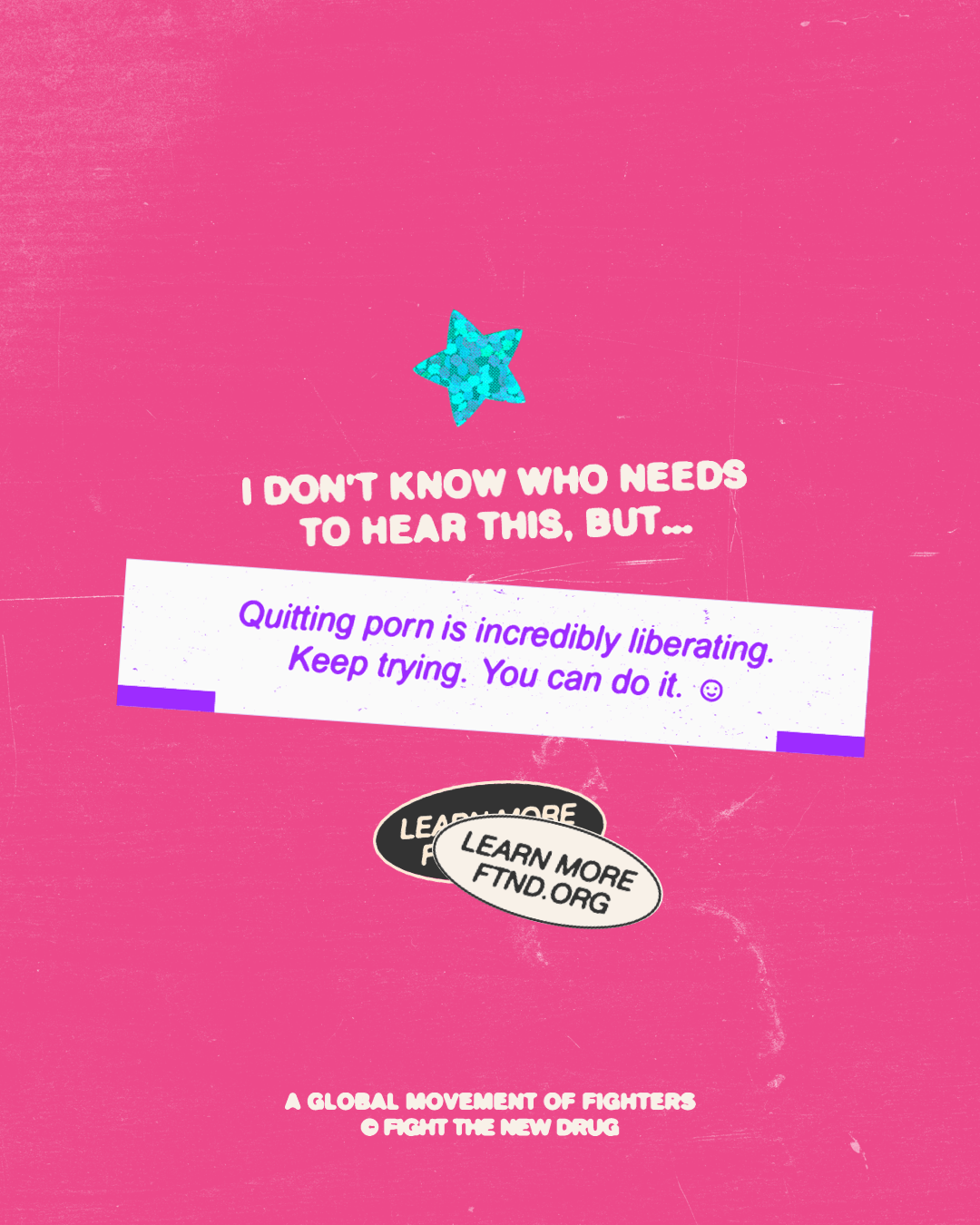As humans, we can be quick to make judgments, often based on how things appear at first glance, without understanding the struggle behind them.
Often, we do not pause to hear someone’s story and find out why they may have certain struggles or act in a particular way. If we did, we might understand that the cliché many of us have heard since childhood—you can’t judge a book by its cover—really does hold true.
When it comes to someone who has experienced the negative effects of porn in their life, it is so important not to write them off as “perverted,” “bad,” or “gross.” Everyone who experiences the negative effects of porn is a human being who has a unique story that deserves to be heard.
To be clear, we’re talking about the people who are struggling with porn and can’t seem to quit it for good yet, but we’re not justifying porn consumption.
Here’s the reality of early porn exposure: Based on available data, the likely age of a child’s first exposure to porn is around tween years. The majority of kids are exposed to porn by age 13, with some exposed as young as seven, according to a 2020 survey.British Board of Film Classification. (2020). Young people, pornography & age-verification. BBFCCopy
But no matter how young, these incidents aren’t isolated cases, and it’s not like early porn exposure only happens to a small slice of people—in fact, in the United States, it happens to almost everybody before they leave their teens. A nationally representative estimate of U.S. youths (ages 14 to 18) exposed to pornography: 84.4% of males and 57% of females.Wright, P. J., Paul, B., & Herbenick, D. (2021). Preliminary insights from a U.S. probability sample on adolescents’ pornography exposure, media psychology, and sexual aggression. J.Health Commun., 26(1), 39-46. doi:10.1080/10810730.2021.1887980Copy
Think back to what you were like when you were a tween. Maybe you loved skateboarding, were involved in your Girl Scout or Boy Scout troop, or spent your time playing computer games. No matter what your hobbies were, none of us were the epitome of maturity at that age–we were just kids doing the things kids like to do.
Now imagine a kid that age being exposed to pornography. Not a healthy thing to see especially at such a young age, is it?
Accidental or unwanted exposure to porn
The fact is, many people who struggle with porn stumbled upon it by accident as kids, maybe through a pop-up on the computer, when they typed in the wrong web address, or through a porn bot on Instagram.
Do you know how often it is these days for the slightest error or most innocent Google search to lead kids to hardcore content? Kids are also sometimes exposed to porn unwillingly by their peers. Others have found a parent’s or older sibling’s stash of porn. At that age, kids generally do not have the maturity or knowledge to know what to do with that kind of content.
Take a few of the many other stories we’ve received from Fighters around the world:
“I saw my first pornographic image when I was nine… I didn’t want it, and I didn’t search for it. It came in the form of a spam email, and I saw a picture of a woman in her underwear. That was all. No nudity, just that. But at nine years old, I knew I had stumbled on something exciting. My young curiosity overcame me and I continued to try and find more of the same.” – P., now 29 years old.
“I was simply a naive kid who didn’t even understand sexual feelings yet and got hooked simply from a happenstance encounter with a book that depicted an inappropriate image.” – T., now 20 years old.
“My story seems somewhat cliche, but I was eight when I was first exposed to porn. My parents were not very computer-savvy, so it was easy for me to cover my tracks. I came from a good home with stable, loving parents, but we never talked about the harms of porn. I was struggling with it before I even knew what it was.” – A., now in his 20’s.
“Around the time I was in fourth or fifth grade, my mother—an emotionally abusive alcoholic—revealed to me her stash of pornographic magazines. As her daughter, she encouraged me to look at and learn from them when she wasn’t home. So when I got the chance and the privacy, I crept to her room and slid open that bottom drawer and grazed over those images.” – B., now 17 years old.
Other people may turn to porn because of past abuse as a child or teen and are using it as an outlet to cope with what happened to them, as they feel porn may provide a temporary escape from the reality of what was done to them.
People who struggle with porn may also have a history of anxiety and/or depression. Porn truly can act as a drug, enabling people to escape from their current reality. It is only a temporary relief, though, and often leads to even greater anxiety and depression because it isolates the consumer and can lead to heavy feelings of shame or social anxiety.
If you have been struggling to quit an unwanted porn habit, please know that you’re not alone. It can feel lonely and frustrating, but there is hope. While research shows that consuming porn can fuel the cycle of loneliness, research also shows that it is possible to overcome a porn habit and its negative effects.Young K. S. (2013). Treatment outcomes using CBT-IA with Internet-addicted patients. Journal of behavioral addictions, 2(4), 209–215. https://doi.org/10.1556/JBA.2.2013.4.3Copy Nathanson, A. (2021). Psychotherapy with young people addicted to internet pornography. Psychoanal. Study Child, 74(1), 160-173. doi:10.1080/00797308.2020.1859286Copy
According to one study of individuals trying to quit porn, researchers found that shame actually predicted increased pornography consumption while guilt predicted sustainable change.Gilliland, R., South, M., Carpenter, B. N., & Hardy, S. A. (2011). The roles of shame and guilt in hypersexual behavior. 18(1), 12-29. doi:10.1080/10720162.2011.551182Copy So if you’re trying to give up porn, be kind to yourself and be patient with your progress. Like anything, it takes time for the brain to recover, but daily efforts make a big difference in the long run.
Porn hijacks a natural desire
The reality is porn preys on and capitalizes on natural human desires that we’re all wired with—the desire to have sex, the desire to be intimate with another person—and it twists them by making it seem like porn provides real fulfillment of those desires. In reality, porn is a lie, and it can’t provide real fulfillment.
Shaming someone who is struggling with porn is the exact opposite of what that person really needs in order to overcome their struggle. Creating an “us vs. them” mentality hurts all of us. It further isolates the porn consumer, sometimes influencing them to turn to porn even more, and it prevents them from feeling they can share their story and receive compassion in return that can empower them to overcome their struggle.
Not seeing those who struggle with porn as real, three-dimensional people hurts society because it can actually perpetuate the problem of a porn habit by preventing people from getting the help they need, further isolating them.
Of course, on the flip side, partners of those who consume porn often experience intense feelings of hurt and betrayal. Partners deserve compassion, too, and a supportive community.
Love, not shame, is the answer
We aren’t trying to wipe porn from the internet. As a non-religious and non-legislative nonprofit, we aren’t focused on the religious or political approaches to fighting porn, and we aren’t a censorship movement.
Rather, we acknowledge that this generation deserves a chance to understand exactly how porn can harm them, how it negatively impacts the mind, and how it fuels exploitation in our world.
We are all about decreasing the demand for porn through education. People have a right to know the harms that can result from consuming pornography. Many people in our society do not know that porn is not only harmful but fuels exploitation. And, when given the facts, we believe that people will choose not to make it part of their lives.
The bottom line is porn consumers are not horrible, “perverted” people. They are real humans with struggles. Some may hate their porn struggle but feel unable to get out or be afraid to ask for help. Some may have no idea that porn fuels trafficking. After all, many were once kids who were confused by porn and did not know how to handle it.
Many were taught lies about their own sexuality through abuse. Many are lonely and need a friend to hear them, be patient with them, and help them get help.
You never know what someone has been through and why they act the way they do until you have heard their story.
This is why, as a movement, we are anti-shame and pro-love.
Need help?
For those reading this who feel they are struggling with pornography, you are not alone. Check out Fortify, a science-based recovery platform dedicated to helping you find lasting freedom from pornography. Fortify now offers a free experience for both teens and adults. Connect with others, learn about your unwanted porn habit, and track your recovery journey. There is hope—sign up today.
Fight the New Drug may receive financial support from purchases made using affiliate links.
Your Support Matters Now More Than Ever
Most kids today are exposed to porn by the age of 12. By the time they’re teenagers, 75% of boys and 70% of girls have already viewed itRobb, M.B., & Mann, S. (2023). Teens and pornography. San Francisco, CA: Common Sense.Copy —often before they’ve had a single healthy conversation about it.
Even more concerning: over half of boys and nearly 40% of girls believe porn is a realistic depiction of sexMartellozzo, E., Monaghan, A., Adler, J. R., Davidson, J., Leyva, R., & Horvath, M. A. H. (2016). “I wasn’t sure it was normal to watch it”: A quantitative and qualitative examination of the impact of online pornography on the values, attitudes, beliefs and behaviours of children and young people. Middlesex University, NSPCC, & Office of the Children’s Commissioner.Copy . And among teens who have seen porn, more than 79% of teens use it to learn how to have sexRobb, M.B., & Mann, S. (2023). Teens and pornography. San Francisco, CA: Common Sense.Copy . That means millions of young people are getting sex ed from violent, degrading content, which becomes their baseline understanding of intimacy. Out of the most popular porn, 33%-88% of videos contain physical aggression and nonconsensual violence-related themesFritz, N., Malic, V., Paul, B., & Zhou, Y. (2020). A descriptive analysis of the types, targets, and relative frequency of aggression in mainstream pornography. Archives of Sexual Behavior, 49(8), 3041-3053. doi:10.1007/s10508-020-01773-0Copy Bridges et al., 2010, “Aggression and Sexual Behavior in Best-Selling Pornography Videos: A Content Analysis,” Violence Against Women.Copy .
From increasing rates of loneliness, depression, and self-doubt, to distorted views of sex, reduced relationship satisfaction, and riskier sexual behavior among teens, porn is impacting individuals, relationships, and society worldwideFight the New Drug. (2024, May). Get the Facts (Series of web articles). Fight the New Drug.Copy .
This is why Fight the New Drug exists—but we can’t do it without you.
Your donation directly fuels the creation of new educational resources, including our awareness-raising videos, podcasts, research-driven articles, engaging school presentations, and digital tools that reach youth where they are: online and in school. It equips individuals, parents, educators, and youth with trustworthy resources to start the conversation.
Will you join us? We’re grateful for whatever you can give—but a recurring donation makes the biggest difference. Every dollar directly supports our vital work, and every individual we reach decreases sexual exploitation. Let’s fight for real love:





